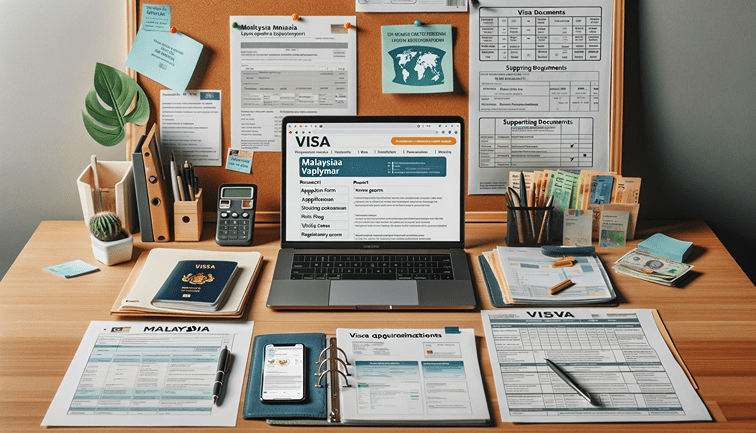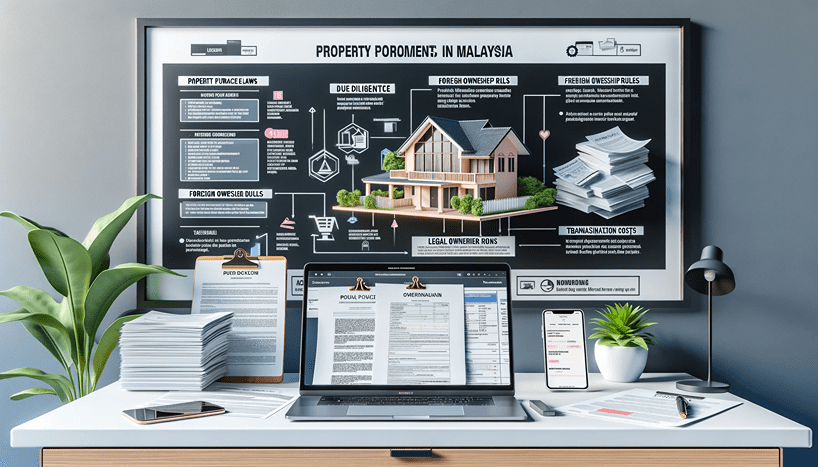Table of Contents

How do expats buy property in Malaysia?
We’re here to break down, step by easy step on how expats can buy property in Malaysia. From the glittering towers of KL to the pristine beaches of Penang, buying property in Malaysia is a breeze for expats with the right information in hand. Get ready to navigate through the legalities like a pro, and discover the must-knows of financing and fees.
Let’s embark on this property purchasing adventure together – your Malaysian dream home awaits! Now lets be real, purchasing property in Malaysia as an expat can be a complex process, but with some careful planning and research, it is possible to buy a home in this Southeast Asian country. Here are some steps to follow when buying property in Malaysia as an expat:
Download Now: Property Buyers Guide [Free Access]
How to research the Malaysian property market

How to determine your budget

It’s important to have a clear idea of how much you can afford to spend on a property in Malaysia. This will help narrow down your search and ensure that you don’t overstretch your budget. Determining your budget for major financial decisions, like purchasing a property or planning a large investment, requires a careful and thorough assessment of your finances.
Start by evaluating your income sources, including your regular salary, any additional earnings, and investment returns. Then, calculate your monthly expenses, considering necessities like food, utilities, transportation, and any debts or loans. This process helps in understanding your disposable income.
It’s also important to also factor in future financial commitments and potential changes in income or expenses. Setting aside a contingency fund for unexpected costs is prudent. Additionally, consider seeking advice from a financial advisor to help you navigate complex financial planning and ensure your budget aligns with your long-term financial goals and risk tolerance. This comprehensive approach ensures you make well-informed decisions that maintain financial stability.
How to find a good real estate agent

A good real estate agent can be a valuable resource when it comes to finding a property in Malaysia. They can help you navigate the local market, find properties that meet your needs and budget, and handle the paperwork and other logistics involved in the purchase process.
Finding a good real estate agent in Malaysia involves several key steps to ensure you partner with a professional who understands your needs and the market. Start by seeking referrals from friends or family who have had positive experiences with agents in the region. Research potential agents online, looking at their reviews, transaction histories, and area of specialisation. It’s important to choose an agent who has a strong track record in the type of property you’re interested in, whether it’s residential, commercial, or investment properties.
Additionally, verify their credentials to ensure they are licensed and registered with the Board of Valuers, Appraisers, Estate Agents and Property Managers (BOVAEP) in Malaysia. During initial consultations, gauge their communication skills, market knowledge, and understanding of your specific requirements. A good real estate agent should not only provide valuable insights into the market but also demonstrate a commitment to representing your best interests throughout the buying or selling process.
How to get a mortgage

If you’re an expat looking to purchase property in Malaysia, you’ll likely need to get a mortgage to finance the purchase. There are several banks in Malaysia that offer mortgages to expats, but the terms and conditions can vary widely. It’s important to shop around and compare offers from different lenders to find the best mortgage for your needs.
Securing a mortgage in Malaysia involves a series of steps designed to assess your financial eligibility and match you with a suitable loan product. Initially, you should review your financial status, including income, debts, and credit history, as these factors heavily influence your borrowing capacity and the terms of the loan. Researching various lenders, such as banks and financial institutions, to compare interest rates, loan terms, and additional fees is crucial.
Once you’ve identified potential lenders, prepare the necessary documentation, typically including proof of income, employment verification, and identification papers. Most lenders also require a property valuation report. It’s advisable to obtain a pre-approval for your loan to understand your budget constraints better before property hunting. Throughout this process, consider consulting with a financial advisor or mortgage broker for expert guidance tailored to your specific circumstances. They can assist in navigating the complexities of loan applications and help secure a mortgage that aligns with your financial goals and capabilities.
How to obtain a visa

If you plan to live in Malaysia long-term, you’ll need to obtain a visa. There are several types of visas available to expats, including work visas, business visas, and student visas. The type of visa you’ll need will depend on the reason for your stay in Malaysia.
Obtaining a visa in Malaysia as a foreigner looking to buy a house typically involves engaging with the Malaysia My Second Home (MM2H) programme, a government initiative that facilitates long-term stays for foreigners. To apply, you must meet specific financial criteria, including proving a stable income source and possessing a certain amount of liquid assets. The process involves submitting a range of documents, such as copies of your passport, bank statements showing financial capability, and a medical report with valid medical insurance. The application can be submitted directly or through an authorised agent.
Upon approval, you’ll be granted a social visit visa, which initially lasts for a period of ten years and is renewable. This visa allows you to purchase property in Malaysia, subject to the minimum investment thresholds set by different states. It’s important to stay updated with the latest regulations and requirements of the MM2H programme, as they are subject to change. Consulting with a legal expert or an authorised MM2H agent can provide valuable assistance in navigating this process.
What are the legal requirements

Buying property in Malaysia as an expat requires you to navigate a complex legal system. It’s important to understand the legal requirements for purchasing property in Malaysia, including any restrictions on foreign ownership and any taxes or fees that may apply.
In Malaysia, buying property as a foreigner involves adhering to specific legal requirements to ensure a smooth and compliant transaction. Firstly, foreigners are typically subject to a minimum purchase price that varies by state, aimed at regulating foreign investment in real estate. Before proceeding, it’s crucial to verify that the property you’re interested in meets this threshold. Additionally, foreigners are generally restricted from buying Malay Reserved Land and properties allocated to Bumiputera interests.
The purchase process involves a series of legal steps, starting with a Letter of Offer/Acceptance and followed by a Sales and Purchase Agreement (SPA), which must be stamped and legally binding. Buyers are also required to pay a deposit, typically 10% of the purchase price. The transaction needs to be conducted through a licensed real estate agent and must include a legal due diligence process, ensuring the property is free from encumbrances and outstanding dues. It’s advisable to engage a Malaysian lawyer who specializes in property transactions to navigate the legal intricacies and ensure compliance with all local property laws and regulations.
How to choose the right property
Choosing the right property in Malaysia requires a well-considered approach that balances your needs, preferences, and financial capacity. Start by defining your primary purpose for the property – whether it’s for personal use, rental income, or long-term investment. Location is crucial; consider factors like accessibility to public transport, proximity to schools, workplaces, healthcare facilities, and commercial centers. Research the local property market to understand price trends and identify areas with potential for growth or stability.
Evaluate the property type that suits your lifestyle or investment goals, be it a high-rise condominium, a landed property, or a commercial space. Pay attention to the property’s age, condition, and potential for future appreciation or rental yield. Don’t overlook the importance of visiting the property, assessing the neighborhood, and understanding the local community dynamics. Finally, consider seeking advice from real estate professionals who can provide insights into market trends and help identify properties that align with your specific criteria.
Once you have a clear understanding of the local property market and your budget, it’s time to start looking for a property. Consider factors such as location, size, and type of property, as well as any amenities or features that are important to you.
How to make an offer

Once you’ve found a property you’re interested in, it’s time to make an offer. Your real estate agent can help you negotiate the terms of the sale, including the price, closing date, and any contingencies that may be included in the contract.
How to finalise the purchase

Once your offer is accepted, you’ll need to finalise the purchase by paying the purchase price and any associated fees. This will usually require signing a sales and purchase agreement and transferring the funds to the seller. Finalising the purchase of a home in Malaysia involves a series of legal steps to ensure a smooth and secure transaction. After your offer is accepted, the next crucial step is the signing of the Sales and Purchase Agreement (SPA). This legal document outlines the terms and conditions of the sale, including payment schedules, completion dates, and any other agreed-upon conditions. Upon signing the SPA, you are typically required to pay a 10% down payment.
The remaining balance is usually paid according to the payment schedule outlined in the SPA, often linked to the construction progress for new developments. It’s essential to arrange the necessary financing during this period, whether through mortgage or other means. The final step is the transfer of property ownership, which involves submitting the necessary documents to the relevant Malaysian authorities for the official transfer of the title deed. This process may also include paying stamp duty and other related fees. Engaging a reputable lawyer and ensuring all documents are thoroughly reviewed and processed correctly is crucial throughout these stages to protect your interests and ensure legal compliance.
When to take possession of the property

Once the purchase is complete, you’ll be ready to take possession of your new property in Malaysia. This may require obtaining keys or other access to the property, as well as paying any fees or taxes that are due. Overall, purchasing property in Malaysia as an expat requires careful planning and attention to detail. By following these steps and working with a good real estate agent, you can successfully navigate the process and buy a home in this beautiful and diverse country.
Taking possession of a property in Malaysia is typically governed by the terms outlined in the Sales and Purchase Agreement (SPA). For new properties, possession usually occurs upon completion of the property’s construction and the issuance of the Certificate of Completion and Compliance (CCC), which confirms the property is fit for occupation and meets all statutory requirements. The developer is obligated to inform the buyer when the CCC is issued, and from this point, the buyer is usually allowed to take possession within a specified period, often within 14 to 30 days.
For secondary market properties, possession generally takes place after the full payment of the purchase price and the completion of all necessary legal and transfer processes, including the registration of the transfer of the title deed. It’s essential for buyers to conduct a thorough inspection of the property before taking possession to ensure it is in the agreed condition and to address any defects or issues. The exact timeline and conditions for taking possession should be clearly stated in the SPA, and it’s advisable to seek legal advice to understand your rights and obligations in this process fully.
Conclusion

In conclusion, for expats looking to purchase property in Malaysia, the process is marked by a combination of clear regulations and attractive opportunities. By understanding and adhering to the specific requirements set for foreign buyers, including minimum purchase values and locations where foreign ownership is permitted, expats can confidently navigate the Malaysian property market.
Key steps include engaging with reliable real estate professionals, conducting thorough market research, and securing financial arrangements, possibly through the Malaysia My Second Home (MM2H) programme. With the right approach, expats can find the process of buying property in Malaysia to be a rewarding experience, allowing them to enjoy the benefits of residing in one of Southeast Asia’s most dynamic and culturally rich countries.

